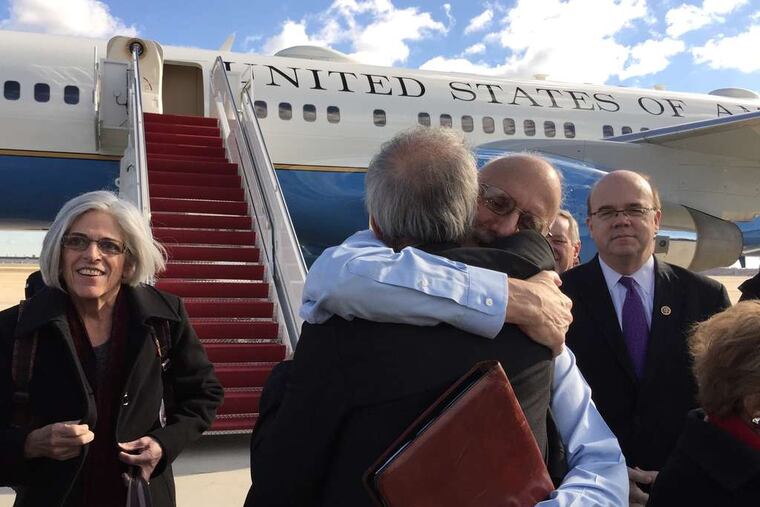A NEW DAY FOR CUBA RELATIONS
WASHINGTON - The United States will restore diplomatic relations with Cuba in the most sweeping changes to U.S.-Cuba policy since President Dwight Eisenhower severed ties with its communist rulers and the two countries faced each other in the most dangerous flash point of the Cold War.

WASHINGTON - The United States will restore diplomatic relations with Cuba in the most sweeping changes to U.S.-Cuba policy since President Dwight Eisenhower severed ties with its communist rulers and the two countries faced each other in the most dangerous flash point of the Cold War.
President Obama said Wednesday that he was scrapping an "outdated approach" to opening the island to democracy after reaching a deal with Cuban leader Raul Castro to release an American jailed in Cuba and three Cubans convicted of spying on the U.S.
"These 50 years have shown that isolation has not worked," Obama said from the White House, announcing the changes as Alan Gross, imprisoned on the island for five years, arrived in the United States. "It's time for a new approach."
The deal - reached after months of secret negotiations in Canada and at the Vatican - also involved the release from prison of a Cuban man Obama described as "one of the most important intelligence agents" that the U.S. ever had in Cuba.
As a result, the United States will set up an embassy in Havana and possibly remove Cuba from the list of states that sponsor terrorism.
The thaw comes decades after the U.S. drew a bright line in response to the revolution on the island 90 miles from Florida, ordering an embargo in 1960.
Now, in addition to opening an embassy, the U.S. will loosen restrictions on travel and trade with the country, making it easier for more Americans to travel there and allowing them to bring back as much as $400, including $100 in alcohol and tobacco.
It will permit the export of certain goods, including building materials for private housing and goods for use by private-sector Cuban entrepreneurs, and allow U.S. credit and debit cards to be used by travelers to Cuba.
The moves are a nearly complete repudiation of the economic stranglehold the U.S. sought to impose soon after Fidel Castro came to power in 1959. Obama said the effort to secure openness and democracy on the island by tightening the economic screws had "failed to advance our interests" and should be replaced.
"I do not expect the changes I am announcing today to bring about a transformation of Cuban society overnight," Obama said. "But I am convinced that through a policy of engagement, we can more effectively stand up for our values and help the Cuban people help themselves as they move into the 21st century."
The moves stop short of lifting the decades-old economic embargo against Cuba - which only Congress can do. But Obama said he would look forward to an "honest and serious debate" about the possibility.
That could prove more difficult than a presidential move. The changes drew backing from the U.S. Chamber of Commerce and agricultural interests that have long eyed Cuba as a lucrative market, but were met with sharp and immediate opposition from some of the staunchest anti-Castro lawmakers in Congress.
Obama said he spoke Tuesday with Raul Castro to review the deal and "made clear my strong belief that Cuban society is constrained by restrictions on its citizens."
Obama promised on the campaign trail in 2008 to seek improved relations with Cuba and loosened some travel restrictions in 2011. But Gross' arrest in December 2009 for smuggling satellite communications equipment to Cuba as part of a U.S. pro-democracy program was a major stumbling block.
Obama sought a review of U.S.-Cuba policy after his 2012 reelection, with talks among high-level U.S. and Cuban officials beginning in June 2013. The result was a swap that involved Wednesday's return to Cuba of three Cubans who were convicted in 2001 in Miami on charges including conspiracy and failure to register as foreign agents.
In exchange, Cuba released the unidentified intelligence asset who Obama said aided in the convictions of the three Cuban spies as well as the convictions of three other Americans who spied for Cuba.
White House officials said the ailing Gross was not an intelligence agent and was not part of the prisoner swap but was released on humanitarian grounds.
The Cuban government also agreed to release 53 political prisoners, increase Internet connectivity to Cubans, and increase engagement - and potentially monitoring - with the United Nations and the International Red Cross.
White House officials said the loosening of restrictions was not in response to a Cuban request but is in the U.S. national interest and will aid Cuba's dissidents.
Cuba wanted the U.S. to end its democracy programs and return use of the Guantanamo Bay Naval Station, but the U.S. refused, said an administration official, speaking on condition of anonymity. "We'll continue to have strong differences," the official said.
The high-level talks - nine in all - were given considerable "confidence and momentum" by Pope Francis, White House officials said. The pope, after talking about Cuba with Obama at a Vatican meeting, wrote letters to Obama and Castro, calling on them to resolve the issues of the prisoners "in order to initiate a new phase in relations between the two parties." A senior administration official said the first Latin American pope was a key factor.
Obama and Raul Castro now will attend the 2015 Summit of the Americas in Panama in April.
INSIDE
The decision to normalize relations elicits strong voices. A17.
Cubans welcome the news. A17.
Republicans vow to block any changes. A18.
Released prisoner said he was a "trusting fool." A18.
Local companies look at Cuba, and consider the possibilities. Business, A19.
Decision means an easier path to the Major Leagues. Sports, D1.